Quality home care for your loved one
Home care with Elder means your loved one feels right at home, in their own home. Elder matches you with trusted and quality live-in carers from across the UK.
Learn about the benefits of home care and the Elder difference.

Used by 5,000+ families across the UK
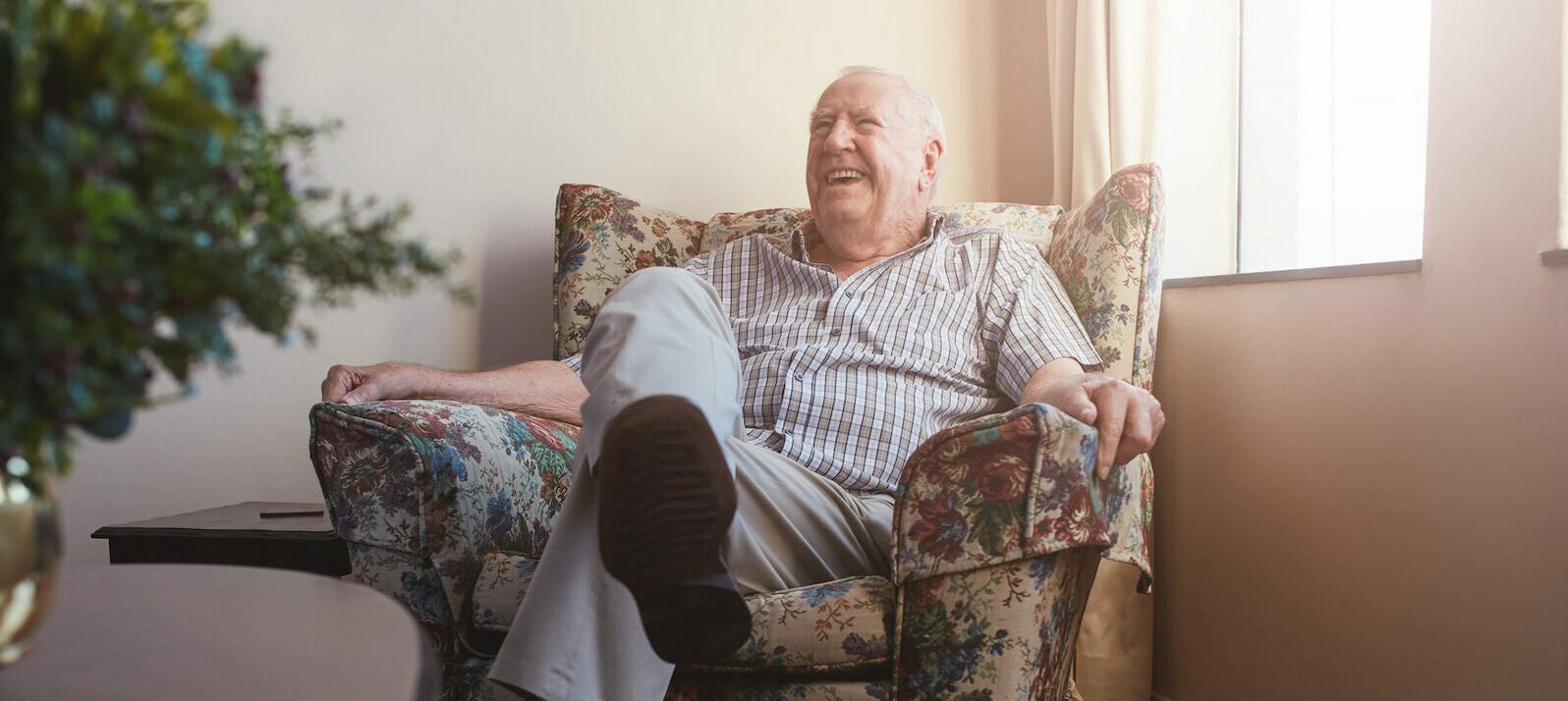
More value
On average, services facilitated by Elder are 35% cheaper than traditional alternatives.
More control
Set your care hours from our custom built app. Manage and collaborate care with family.
More choice
View carer profiles, read reviews from other families, and arrange a video/phone call ahead of placement.
More support
From our family support specialist to our in-house clinical team, we’re on hand if you need us.

We are an award-winning marketplace connecting families and carers.
Every care story is personal, and ours is no different. Our founder, Pete, was inspired to help families like yours after struggling to find the right care for his own Gran, Frances. Fast forward to today and our platform has connected thousands of families and self-employed carers. Our tools personalise every care experience, eliminate unnecessary paperwork, and empower families to take control of later life.
What is home care?
Home care, also known as domiciliary care, is when a professional carer provides support to someone in their own home. It’s a way for older people to stay in a place they know and love, while still getting the help they need day to day.
Care at home can be tailored to the individual. A carer might visit for just a few hours a week to help with things like medication, meal preparation, or personal care. For those who need more consistent support, a live-in carer can move in to offer round-the-clock help, including with household tasks, mobility, and companionship.
The aim of home care is to help people maintain their independence and quality of life. It offers a reassuring alternative to residential care, allowing families to stay connected and individuals to continue living life on their own terms.
Nearly one million people across the UK receive some form of home care – and with its flexibility and focus on the individual, it’s easy to see why.
When to consider care at home
If your loved one is finding it harder to live safely or comfortably on their own, it may be time to consider professional care at home. There’s no specific age, condition or stage that signals the ‘right’ time – often, it’s simply when daily life becomes more difficult or they’re no longer able to live as independently as they once did.
Home care is designed to help older people stay in the place they know and love, while receiving the practical and emotional support they need to continue living life on their terms.
Here are some signs that in-home care could help your loved one:
Struggling with everyday tasks
If your loved one is finding it harder to manage things like washing, dressing, cooking or cleaning on their own.
Becoming less mobile
They may need help moving safely around the home, getting in and out of bed, or using mobility aids confidently.
Withdrawing or feeling isolated
You’ve noticed they’re seeing fewer people, losing interest in hobbies, or feeling lonely at home.
Recovering after a hospital discharge
They may need short-term support while they regain strength and confidence.
Living with a long-term or complex condition
Conditions like dementia, Parkinson’s, or heart failure can be better managed with tailored care at home.
Reluctant to move into a care home
Home care allows them to stay in a familiar setting while still receiving the right level of support.
Types of home care services we offer
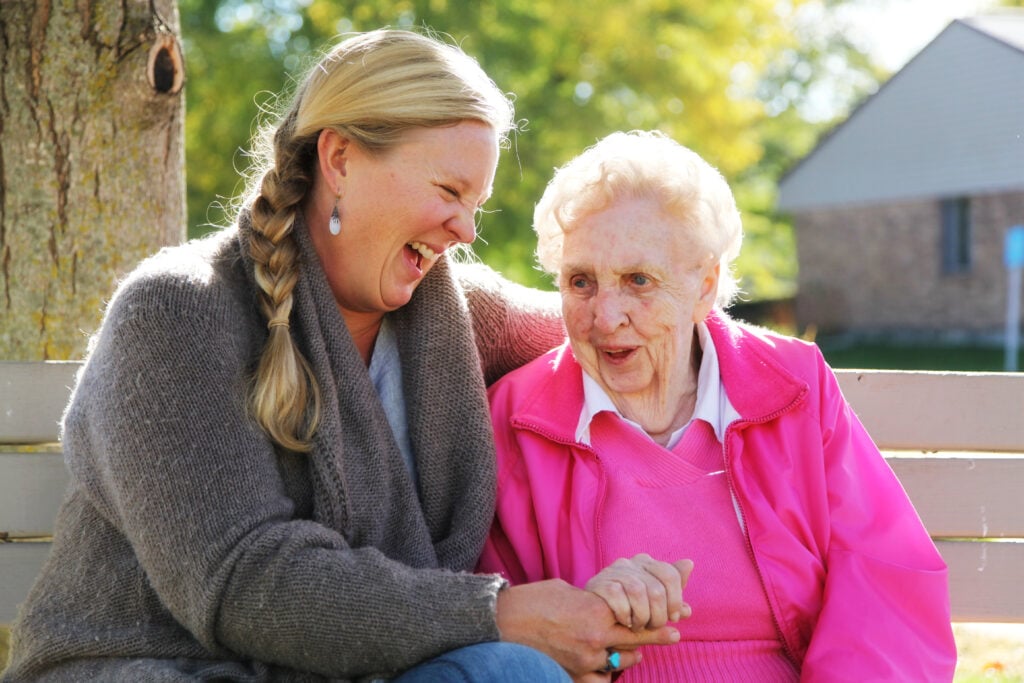
Live-in care
At Elder, live-in care means a dedicated carer moves into your loved one’s home to provide one-to-one support throughout the day, with occasional help during the night. This offers continuity, companionship, and personalised care, helping your loved one maintain their routine and quality of life in a familiar surrounding.
Learn more about live-in care.

Visiting care
Also known as hourly care, visiting care involves a carer visiting your loved one’s home at agreed times to assist with daily tasks such as personal care, meal preparation, and medication. Home care visits can range from an hour to several hours, depending on their needs, whether that’s once a day or a few times a week.
Learn more about visiting care.
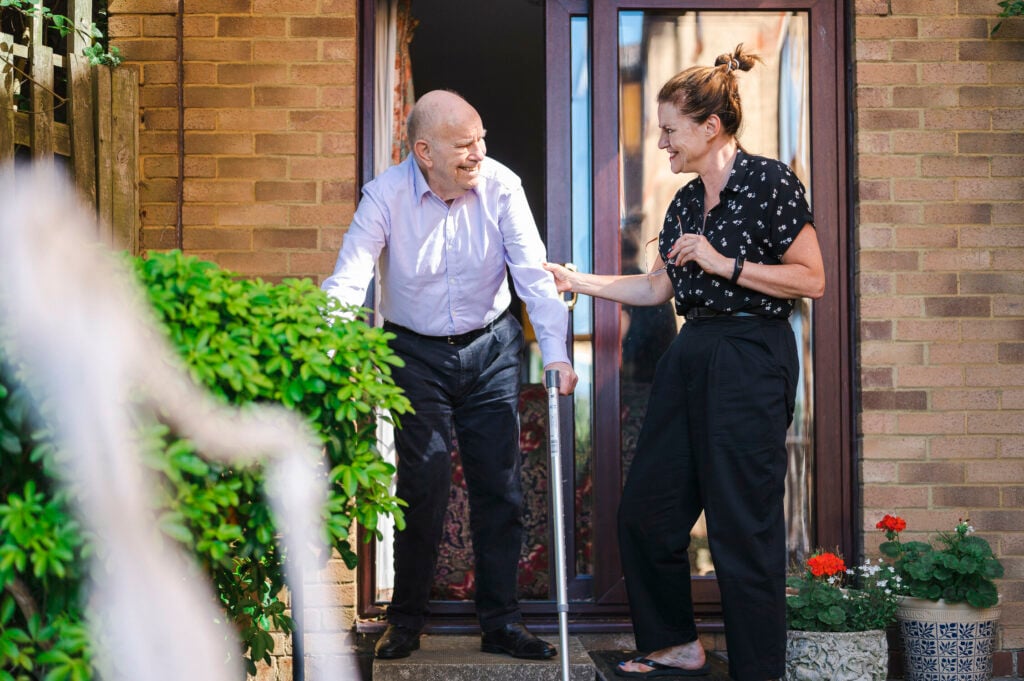
Respite care
Respite care provides short-term support when your loved one’s regular carer is on holiday, unwell, or when extra help is needed after a hospital discharge. This can be arranged as visiting care or live-in care, giving you peace of mind while your loved one recovers or you take a much-needed break.
Learn more about respite care.
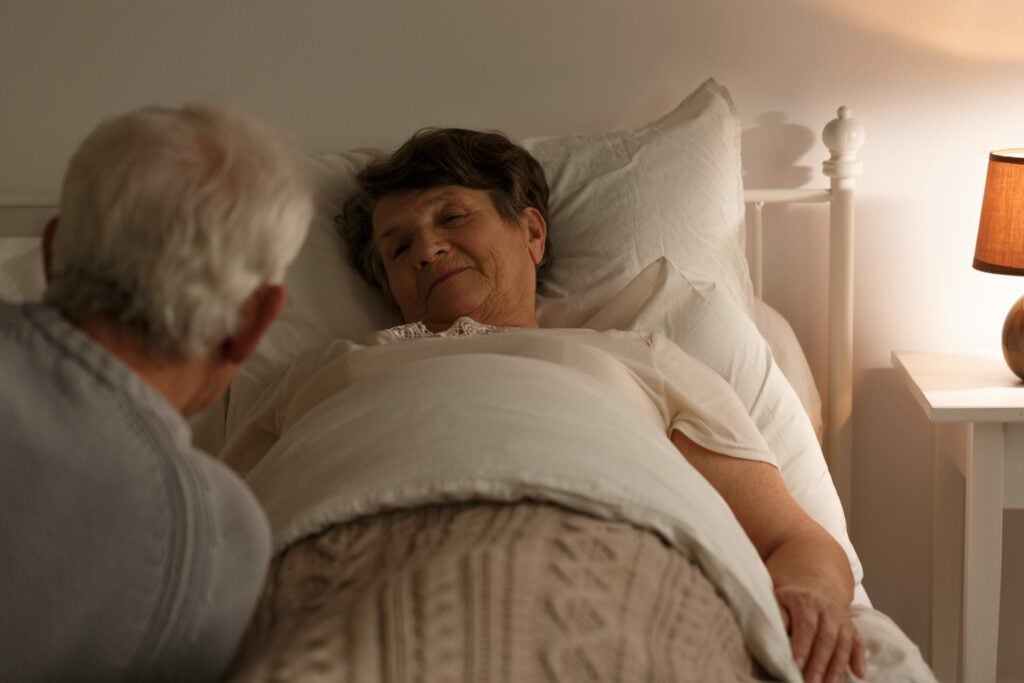
Overnight care
Our overnight care options include both waking-night carers, who stay awake throughout the night to provide support, and sleeping-night carers, who stay at your loved one’s home but are available if needed. Some families also choose two carers working in shifts for round-the-clock care.
Learn more about overnight care.
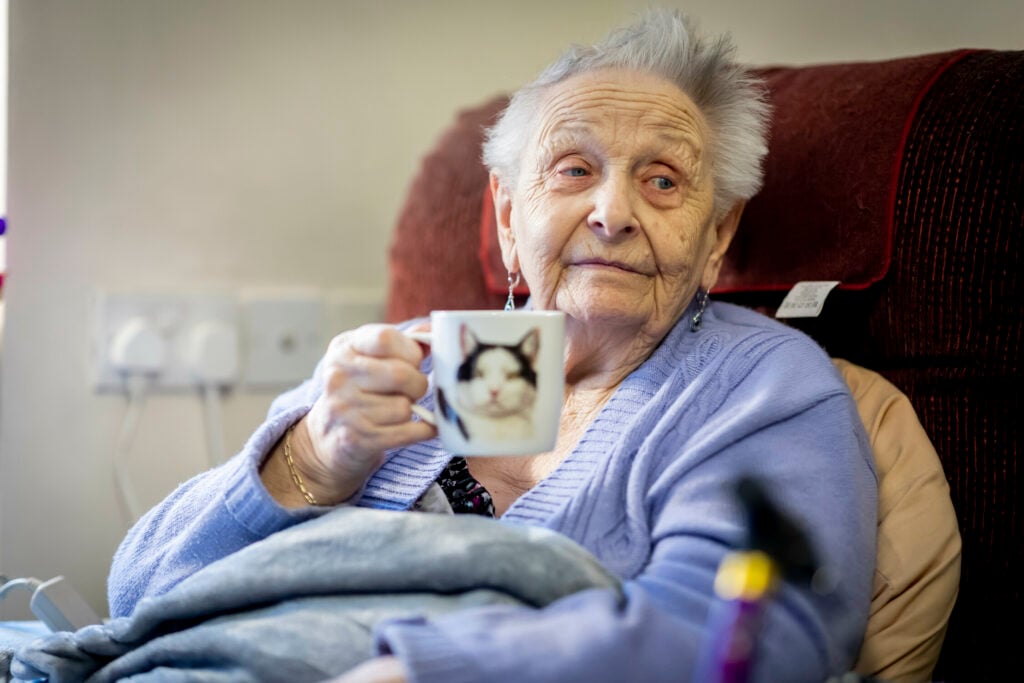
Palliative care and end of life care
If your loved one is living with a terminal illness, our palliative and end of life care helps them stay in the comfort of their own home, supported by a compassionate carer. This type of care is tailored to their changing needs and often follows the five stages of palliative care, with a focus on comfort, dignity and emotional support. Our carers also work alongside healthcare professionals to ensure every aspect of care is carefully coordinated.
Learn more about palliative care.
What can a home carer support with?
A home carer provides practical and emotional support to help your loved one live well in the comfort of their own home. Whether it’s a daily check-in or round-the-clock live-in care, they’re there to make everyday life easier and safer. Here are some of the tasks a home carer can support with:
Daily tasks
Help with housework, laundry, changing bed sheets, light gardening, and preparing meals.
Personal care
Support with washing, dressing, grooming, using the toilet, and morning or bedtime routines.
Mobility support
Assistance moving safely around the home, getting in and out of bed, and doing light exercises.
Medication help
Prompting and managing medication, spotting early signs of illness, and offering general wellbeing checks.
Errands and outings
Support with shopping, collecting prescriptions, attending appointments, or getting out for fresh air and social visits.
Companionship
A friendly presence to talk to, spend time with, and reduce feelings of loneliness or isolation.
Nursing care at home
While home care includes essential support with personal care and daily tasks, it typically doesn’t cover medical procedures. The carers on Elder’s platform can help with things like bathing, companionship, and medication reminders, but they’re not trained to carry out clinical tasks. For more information, read this guide.
Some care providers are regulated to deliver nurse-led care, such as PEG feeding or STOMA care, but even then, these tasks must be overseen by a qualified nurse. In many cases, a district nurse will still need to visit the home to handle more complex needs.
If your loved one has specific medical requirements, it’s important to be clear about these when speaking to care providers. This will help you find the right type of support and avoid any gaps in care.
Home care vs care home: what’s the difference?
Choosing between care at home and a residential care home depends on your loved one’s unique needs, preferences, and overall health. Understanding the key differences can help you feel more confident about what’s right for them.
Why home care is often the preferred choice
For many families, home care is the most appealing option. It enables your loved one to remain in the comfort and familiarity of their own home, surrounded by their memories, pets, and community. They can continue living life on their own terms – waking up when they choose, eating meals they enjoy, and seeing family and friends without needing to sign in or stick to visiting hours.
Unlike a care home, where staff must divide their attention between multiple residents, home care offers consistent, one-to-one support that’s completely tailored to your loved one’s needs. Whether that’s help with getting dressed, preparing meals, managing medication, or simply offering companionship, a home carer can build a close and trusting relationship that supports not just daily routines, but emotional wellbeing too.
Home care also gives families more flexibility. You can choose the type and level of care that suits your loved one – be that a few visits a week, full-time live-in care, or support for a specific condition – without the disruption of moving away from home.
When a care home might be a better fit
There are situations where a care home may be more suitable, especially if your loved one is living with a complex condition that causes unpredictable or aggressive behaviours. In these cases, a care home can provide a safer, more controlled environment, with 24/7 supervision and access to a team of professionals.
Care homes may also appeal to those who enjoy group activities or prefer the structure of set routines. However, it’s important to weigh these benefits against the loss of personal freedom, privacy, and choice. Many care homes have fixed schedules for meals, limited flexibility, and may require moving away from the local area to find the right fit.
Supporting independence with care at home
Home care supports independence in a way care homes often can’t. It allows your loved one to keep their lifestyle, their home, and their sense of control. With Elder, every care arrangement is built around what matters most to your family, so your loved one receives the support they need, without giving up the life they love.
How much does home care cost?
Home care costs depend on where your loved one lives, the level of support they need, and the type of care provider you choose.
How much does home care cost per hour in the UK?
On average, home care in the UK costs between £16 and £26+ per hour, although rates can be higher depending on your location. Some care agencies require a minimum booking of one hour, even if you don’t need the full time.
If your loved one needs round-the-clock support, live-in care typically starts at £1,000+ per week, with many families paying around £1,500 for a managed agency service. Elder’s home care services are on average 35% cheaper than traditional managed providers. And, in many regions of the UK, home care fees can be comparable to care home fees. Elder does not charge extra for weekends or public holidays, and there are no joining fees.
Is in-home care free in the UK?
In most cases, in-home care is not free, but there are ways to receive financial assistance. If your loved one needs care, your first step should be to contact their local council for a care needs assessment. If care is recommended, the council will carry out a financial means test to decide whether they’re eligible for help with costs.
Their level of support will depend on their income and assets:
- England: They may qualify for local authority funding if they have savings below £23,250.
- Wales: The savings threshold is £50,000.
- Scotland: They will need savings under £35,000 to be eligible, though some personal care is funded regardless of income.
Even if your loved one is entitled to support, you may still need to contribute to their care costs, especially if your chosen provider charges more than the council’s standard rate. In this case, you or your family would need to cover the difference.
What funding options are available for home care?
There are a few ways to make care at home more affordable:
- Local council support: Start by requesting a care needs assessment from your loved one’s local council. If your loved one qualifies, they may offer full or partial funding depending on their financial situation. You can also request direct payments to choose your own care provider.
- NHS Continuing Healthcare (CHC): If your loved one has ongoing, complex health needs, they may qualify for free NHS-funded care at home. To apply, speak with their GP, district nurse, or hospital discharge team.
- State benefits: Your loved one may also be entitled to benefits such as Attendance Allowance, Pension Credit, Cold Weather Payments, or a reduction in council tax, which can help offset the cost of care.
To explore your options in more detail, visit our Funding your care page for up-to-date information and helpful resources.
How to arrange home care with Elder
1. Share your care request
Tell us your care requirements using our request form, including the type of care you’re looking for, any specialist skills you need, and what daily life looks like.
2. Select your carer
You’ll start receiving profiles of suitable self-employed carers within 24 hours. Chat to them online or arrange a phone or video call, before choosing who you like best.
3. Manage care
Once your agreement with your carer begins, use your MyElder account to chat with them and the Elder team, manage your schedule and care information, and find respite cover if you need it.
Real stories: Colin and Dulcie’s experience with home care
Dulcie is one of our longest-serving customers. She has dementia and lives with her son Colin, his wife Mary and her live-in carer Sarah.
In this short video, we talk to the family about the challenges of finding the right care solution for a fiercely independent woman – and how the positive benefits of live-in care have transformed all of their lives.
FAQs about home care
-
How can home care help me?
If you’re worried about a loved one struggling with tasks like housework, mobility, or eating well, home care can provide practical support and help keep their home safe.
For those living alone, carers also offer companionship, which can help reduce loneliness – a common issue among older people in the UK.
It’s normal to feel unsure about having a carer, but accepting help doesn’t mean losing independence. Home care lets your loved one focus on what they enjoy while someone assists with daily tasks. With Elder, you can even choose a carer who matches their personality, making the experience more comfortable and personal.
-
What’s the difference between a private carer and agency service?
When choosing home care, you can hire a private carer, use a managed care agency, or go through an introductory service:
- Private carers offer more choice and flexibility without agency fees, but you’ll be responsible for background checks, contracts, and payments.
- Managed care agencies handle all this for you, providing trained staff and care plans, but at a higher cost and with less flexibility.
- Introductory services like Elder act as a middle ground by pre-screening self-employed carers and managing payments, while you keep control over care arrangements and daily routines.
-
What can I do to make my loved one’s home safer?
To help your loved one stay safe and comfortable at home, consider making some simple changes to their living space. This might include rearranging or removing furniture to reduce trip hazards, installing safety features like handrails, ramps, or stairlifts, and adding practical security measures such as automatic cooker shut-offs.
For a detailed look at these options and more, check out our comprehensive guide to home adaptations.
-
Do Elder’s home carers have insurance?
Yes. At Elder, we encourage all self-employed carers on our platform to have the appropriate insurance. For more details, see our guide to home care and carer insurance.
-
How are home carers screened before joining the Elder platform?
We know how important it is to feel confident in the carer supporting your loved one. That’s why every self-employed carer on the Elder platform must pass a suitability screening before joining. This includes:
- Professional care experience – Carers must have previous experience in a professional setting, such as a private home, care home, or healthcare facility. We don’t accept personal or family-only care experience.
- Strong communication skills – A good level of written and spoken English is essential.
- Proof of identity – Carers must provide valid photo ID and have the Right to Work in the UK.
- Background checks – All carers must be eligible to pass an enhanced DBS check (England and Wales).
- References – Carers are required to supply at least two verifiable professional references.
- Screening assessments – Each carer completes a series of situational judgment and character assessments to help us understand their approach to care.
-
How can I tell if Elder’s home care services are right for my loved one’s needs?
Start by creating a free MyElder account – there’s no obligation to proceed. You’ll answer a few questions designed by our clinical team to assess your loved one’s daily living needs and any changes in their health or well-being.
This helps determine if our self-employed carers can provide the right support. If your needs go beyond what our carers offer, we’ll let you know and guide you on the best next steps.
Read more about home care

What type of background checks should I be doing on a home carer?
What type of background checks should I be doing on a home carer? When you employ a home carer to look after a vulnerable loved

Elderly nutrition: cooking & meal preparation for the elderly
Elderly nutrition: cooking & meal preparation for the elderly Healthy eating should always be a priority, but as we age, our nutritional needs change as

What domestic tasks will a home carer look after?
What domestic tasks will a home carer look after? Live-in carers are at the heart of our comprehensive approach to round-the-clock home care. Care isn’t

Home care and self-employed carer insurance
How are home carers insured? Deciding to bring on care at home for a loved one can be an emotional process. Because of this, you

How to care for elderly couples and keep them together
How to Care for Elderly Couples When a couple has lived together for many years, they usually want to stay together, however this can be

Home help for the elderly
It’s natural to need a little help with things as we age. However, if you or a loved one is finding daily tasks more difficult,